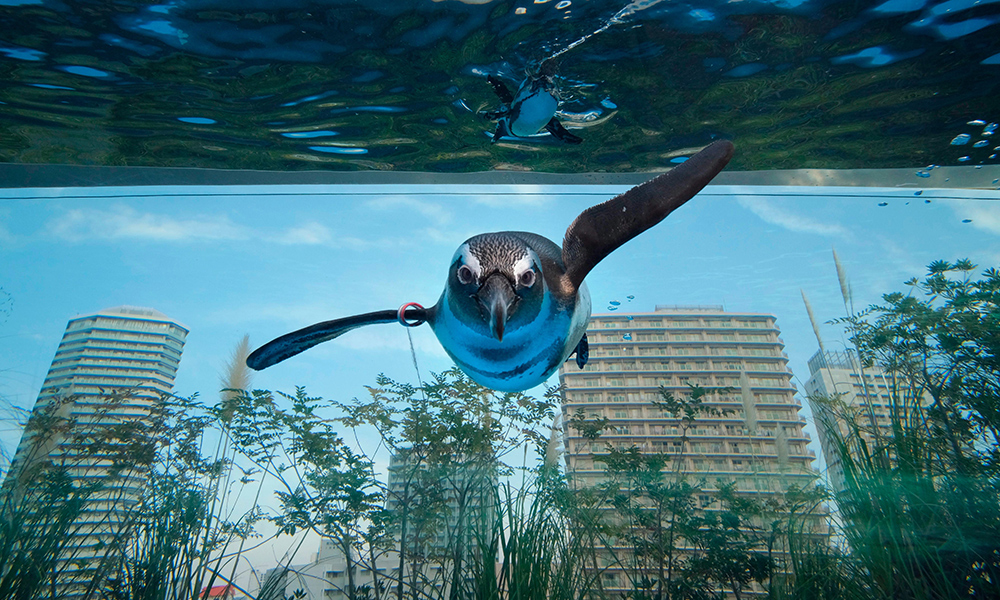
因为通货膨胀和利率上升给经济带来的不确定性,各国决策者都在密切监测全球各地的消费者行为。但或许他们对另一个重要群体给予的关注还不够:企鹅。
上周,一段来自日本某新闻网络的视频火爆网络。视频中,日本箱根水族馆(Hakone-en Aquarium)的企鹅拒食某种比它们吃惯了的品种要便宜的鱼,以实际行动抗议园区这种削减成本应对通货膨胀的举措。
“一开始,它们还是把鱼放进了嘴里,但觉得不喜欢,就吐了。”水族馆的负责人岛本广树说,“它们觉察出了不对劲。”
不同于常见的竹荚鱼(也称马鲭鱼),水族馆试着给企鹅喂一种更常见的鲭鱼,名为saba鱼,这种鱼的个头更大,而且从这种挑剔的、不会飞的鸟类的反应来看,也没有那么美味。在全日本新闻网(All-Nippon News Network)发布的这段视频中,我们能够看到,企鹅在饲养员给它们喂食新品种时,会把喙移开。
视频中,水族馆里的水獭也做出了类似的反应。
岛本向美国有线电视新闻网(CNN)下属的朝日电视台(TV Asahi)表示:“理想情况下,它们想吃的是一份完整的竹荚鱼,却不得不忍着性子吃鲭鱼。”据岛本介绍,除了降低饲料成本,水族馆还打算关掉一些设备来节省电费。他们希望可以不用涨门票。
这家水族馆的反应说明,即便是相对较小的通胀也会对消费者支出产生重大影响。截至今年5月,日本通货膨胀(包括食品价格,但不包括能源价格)较上年同期增长2.1%。
在将能源成本计算在内的英国和美国,通胀率分别达到了9.1%和8.6%,均为40年来最高水平。欧元区的通胀率也达到了有史以来最高水平,为8.6%。全球其他国家也同样受到通胀影响,南非和澳大利亚都创下了新的通胀纪录。
除了不断上升的通货膨胀,日本还需要应对本国货币贬值的挑战。今年6月,日元对美元的汇率创下24年来新低。日元贬值的部分原因是,在其他国家的央行纷纷提高利率的情况下,日本央行(Bank of Japan)仍然维持着接近0.0%的宽松货币政策。
例如,瑞士央行(Swiss National Bank)在6月将利率上调50个基点,这是该行自2007年以来首次加息。欧洲央行(European Central Bank)预计本月将采取类似行动,而英国央行自去年12月以来已经五次加息。
美联储(Federal Reserve)今年以来已经加息三次,其中6月的加息为1994年以来幅度最大的一次。尽管经济衰退迹象已经隐约可见,美联储仍然可能进一步加息。
为了维持经济增长,土耳其也采取了类似的宽松货币政策。自去年12月以来,土耳其一直将基准利率维持在14%,且没有任何提高基准利率的苗头。然而,与日本不同的是,土耳其的通胀情况全球倒数,根据该国政府在7月4日公布的数据,目前土耳其的通胀率为78.6%。
不过,即使日本的通胀可能继续上升,也不会对企鹅构成任何真正的威胁。“水族馆里的所有动物都是我们的家人,我们会尽最大努力保证它们的健康。”岛本说,“我们永远不会强迫任何动物吃它们不想吃的食物。”(财富中文网)
译者:Agatha
因为通货膨胀和利率上升给经济带来的不确定性,各国决策者都在密切监测全球各地的消费者行为。但或许他们对另一个重要群体给予的关注还不够:企鹅。
上周,一段来自日本某新闻网络的视频火爆网络。视频中,日本箱根水族馆(Hakone-en Aquarium)的企鹅拒食某种比它们吃惯了的品种要便宜的鱼,以实际行动抗议园区这种削减成本应对通货膨胀的举措。
“一开始,它们还是把鱼放进了嘴里,但觉得不喜欢,就吐了。”水族馆的负责人岛本广树说,“它们觉察出了不对劲。”
不同于常见的竹荚鱼(也称马鲭鱼),水族馆试着给企鹅喂一种更常见的鲭鱼,名为saba鱼,这种鱼的个头更大,而且从这种挑剔的、不会飞的鸟类的反应来看,也没有那么美味。在全日本新闻网(All-Nippon News Network)发布的这段视频中,我们能够看到,企鹅在饲养员给它们喂食新品种时,会把喙移开。
视频中,水族馆里的水獭也做出了类似的反应。
岛本向美国有线电视新闻网(CNN)下属的朝日电视台(TV Asahi)表示:“理想情况下,它们想吃的是一份完整的竹荚鱼,却不得不忍着性子吃鲭鱼。”据岛本介绍,除了降低饲料成本,水族馆还打算关掉一些设备来节省电费。他们希望可以不用涨门票。
这家水族馆的反应说明,即便是相对较小的通胀也会对消费者支出产生重大影响。截至今年5月,日本通货膨胀(包括食品价格,但不包括能源价格)较上年同期增长2.1%。
在将能源成本计算在内的英国和美国,通胀率分别达到了9.1%和8.6%,均为40年来最高水平。欧元区的通胀率也达到了有史以来最高水平,为8.6%。全球其他国家也同样受到通胀影响,南非和澳大利亚都创下了新的通胀纪录。
除了不断上升的通货膨胀,日本还需要应对本国货币贬值的挑战。今年6月,日元对美元的汇率创下24年来新低。日元贬值的部分原因是,在其他国家的央行纷纷提高利率的情况下,日本央行(Bank of Japan)仍然维持着接近0.0%的宽松货币政策。
例如,瑞士央行(Swiss National Bank)在6月将利率上调50个基点,这是该行自2007年以来首次加息。欧洲央行(European Central Bank)预计本月将采取类似行动,而英国央行自去年12月以来已经五次加息。
美联储(Federal Reserve)今年以来已经加息三次,其中6月的加息为1994年以来幅度最大的一次。尽管经济衰退迹象已经隐约可见,美联储仍然可能进一步加息。
为了维持经济增长,土耳其也采取了类似的宽松货币政策。自去年12月以来,土耳其一直将基准利率维持在14%,且没有任何提高基准利率的苗头。然而,与日本不同的是,土耳其的通胀情况全球倒数,根据该国政府在7月4日公布的数据,目前土耳其的通胀率为78.6%。
不过,即使日本的通胀可能继续上升,也不会对企鹅构成任何真正的威胁。“水族馆里的所有动物都是我们的家人,我们会尽最大努力保证它们的健康。”岛本说,“我们永远不会强迫任何动物吃它们不想吃的食物。”(财富中文网)
译者:Agatha
Policymakers are scrutinizing consumer behavior throughout the world as rising inflation and interest rates inject uncertainty into the economy. But perhaps they haven't paid enough attention to another important group: penguins.
A video from a Japanese news network went viral last week showing penguins at the country’s Hakone-en Aquarium rejecting a cheaper type of fish than what they’re accustomed to feasting on, effectively protesting their caretakers’ efforts to cope with inflation by cutting costs.
“They take it into their mouths at first, but then they decide they don’t like it and drop it,” said aquarium head Hiroki Shimamoto. “They sense something is off.”
Rather than the usual aji, or Japanese horse mackerel, the aquarium has been trying to feed its penguins a more common type of mackerel called saba that’s larger and, according to the finicky, flightless birds, less appetizing. In the video from All-Nippon News Network, the penguins can be seen turning their beaks away when a caretaker offers them the alternative fish.
Otters at the aquarium have responded similarly, per the video.
“Ideally, they would like to have a full aji, but they are patiently eating mackerel,” Shimamoto told TV Asahi, a CNN affiliate. Beyond cutting down on fish costs, the aquarium has also looked to save on electricity costs by shutting down certain pieces of equipment, according to Shimamoto. The aquarium hopes to not raise its admission fee.
The aquarium’s actions demonstrate how even relatively minor inflation can have a significant impact on consumer spending. Inflation in Japan, which includes food prices but excludes energy, increased 2.1% year-over-year as of May.
In the U.K and U.S., where energy costs are included in calculations, inflation has reached four-decade highs of 9.1% and 8.6% respectively. It’s also the highest it’s ever been in the eurozone, currently standing at 8.6%. It’s impacting other countries across the globe as well, with South Africa and Australia also hitting new inflation records.
In addition to rising inflation, Japan is also dealing with a weakened national currency, with the yen hitting a 24-year-low against the U.S. dollar in June. That decline in value is in part due to the Bank of Japan (BOJ) maintaining a loose monetary policy with interest rates near 0.0% even as central banks of other countries raise theirs.
The Swiss National Bank, for example, increased its interest rate 50 basis points in June in its first rate hike since 2007. The European Central Bank (ECB) is expected to take similar action this month, while the Bank of England has increased its interest rate five times since December.
The Federal Reserve in the U.S. has so far instituted three interest rate hikes this year, including its biggest since 1994 in June. The bank will likely impose further hikes even as signs of an economic downturn loom.
One country that has similarly maintained a loose monetary policy for the sake of economic growth is Turkey, which has kept its baseline interest rate at 14% since December and has shown no signs of increasing it. Unlike Japan, however, Turkey’s rate of inflation is among the worst in the world, currently at 78.6% according to government data released on July 4.
The prospect of inflation continuing to increase in Japan doesn’t pose any real threat to its penguins, however. “All of the animals at the aquarium are family and we do our best to keep them healthy,” said Shimamoto. “We would never force any animal to eat what they don't want.”






